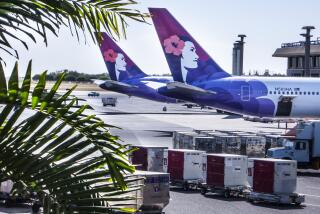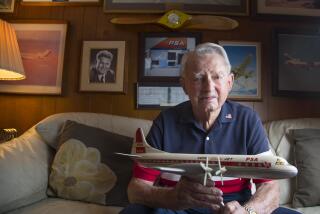An Airline of Many Firsts, Missed Already by Veterans
- Share via
ST. LOUIS — Pilot James Lawlor has grown fond of that TWA emblem on his jacket--the same emblem his father, also a pilot, wore for 33 years before retiring in 1999.
Now, Lawlor and 20,000 other Trans World Airlines Inc. workers will have to get used to new attire. On Monday, a federal bankruptcy judge gave the go-ahead for American Airlines to buy TWA. Barring objection from regulators, the decision will eventually bring an end to one of the oldest and most recognizable names in aviation history.
“I’m pretty sad,” Lawlor, of Kansas City, said after he heard the news at Kansas City International Airport. “It’s been a good place to work.”
Still, he figured the deal was for the best.
“If they’d sold the assets, I think it’s quite probable a lot of us would be out of jobs,” Lawlor said. “So the buyout beats the alternative.”
Lawlor’s reaction was like that of many connected to TWA--glad to say goodbye to the financial black cloud that has hung over the airline and its workers for more than a decade, still sorry to see it go.
“That’s the big drawback, that we’ll lose the name that’s been a hallmark in aviation for years and years,” said Al Lane, a retired TWA pilot who is now a state representative in Kansas.
No timetable has been offered for phasing out the TWA name, though it won’t go away immediately. The Justice Department still has to sign off on the merger. TWA workers must undergo training in the American way of business. Planes will have to be repainted.
TWA has been flying longer than any other carrier.
It was founded July 13, 1925, as Western Air Express. In 1930, it became Transcontinental and Western Air, a mouthful by any standard. People started calling it TWA.
In 1950, movie mogul Howard Hughes, who owned a controlling interest in TWA, redubbed it Trans World Airlines, providing a more palatable name to go with the TWA acronym.
In its prime, TWA was the airline of choice for many of the rich and famous. Joe DiMaggio made flights west on TWA’s Lockheed Constellation to visit wife Marilyn Monroe in Hollywood. Four times, the pope flew TWA on visits to the U.S., including his 1999 trip to St. Louis, a special honor for TWA since the airline is based here.
The airline has roots in Missouri. Its headquarters were in Kansas City from 1931 to the mid-1950s. TWA’s maintenance facility remains at the Kansas City airport and employs 3,600 workers.
St. Louis’ Lambert Airport has long been the airline’s domestic hub, and TWA officially made St. Louis its home by relocating its headquarters here in 1994. Some 8,700 TWA employees work out of St. Louis.
Financial struggles didn’t lessen with the move back to the Midwest.
The problems began when billionaire financier Carl Icahn took TWA private in 1988. Icahn received $469 million, but the deal added $539.7 million to the airline’s debt. After 1989, TWA would never again turn an annual profit.
Languishing in debt in 1991, Icahn sold TWA’s main London routes to American Airlines. Icahn resigned as chairman a year later.
On Jan. 31, 1992, TWA filed for Chapter 11 bankruptcy protection, the first of three times the airline would do so. The last time was Jan. 10, the day its deal with American was announced.
Despite its financial hardship, TWA has consistently ranked among at or near the top in on-time performance. It can also claim many firsts.
TWA was the first airline to offer coast-to-coast service, a combination of air and rail, starting July 7, 1929. The nation’s first air cargo service, a shipment of livestock from St. Louis to Newark, N.J., was on a 1931 TWA flight.
It flew the nation’s first all-jet fleet, was the first carrier to fly the Boeing 747 on a domestic route, and was first to offer nonsmoking sections on all aircraft.
Paul and Karen Martin of Prairie Village, Kan., were leaving Kansas City en route to Ireland on Monday when they heard the news. Paul Martin retired as a TWA pilot in 1985, the day Icahn took over.
Karen Martin called TWA’s demise “very sad. We all remember the days when it was a great, great airline.”
More to Read
Inside the business of entertainment
The Wide Shot brings you news, analysis and insights on everything from streaming wars to production — and what it all means for the future.
You may occasionally receive promotional content from the Los Angeles Times.










